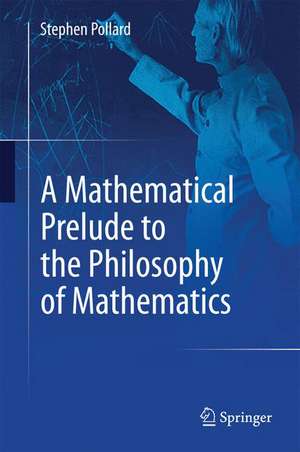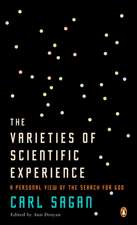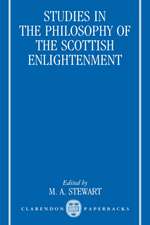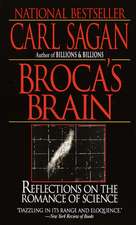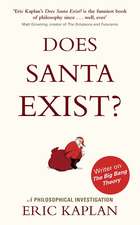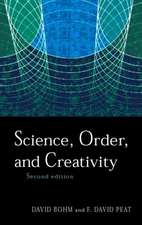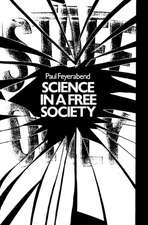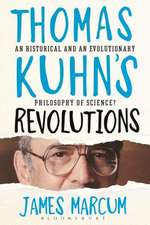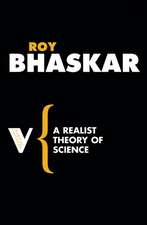A Mathematical Prelude to the Philosophy of Mathematics
Autor Stephen Pollarden Limba Engleză Hardback – 22 mai 2014
| Toate formatele și edițiile | Preț | Express |
|---|---|---|
| Paperback (1) | 512.27 lei 43-57 zile | |
| Springer International Publishing – 3 sep 2016 | 512.27 lei 43-57 zile | |
| Hardback (1) | 618.20 lei 43-57 zile | |
| Springer International Publishing – 22 mai 2014 | 618.20 lei 43-57 zile |
Preț: 618.20 lei
Preț vechi: 727.29 lei
-15% Nou
Puncte Express: 927
Preț estimativ în valută:
118.29€ • 123.82$ • 98.46£
118.29€ • 123.82$ • 98.46£
Carte tipărită la comandă
Livrare economică 31 martie-14 aprilie
Preluare comenzi: 021 569.72.76
Specificații
ISBN-13: 9783319058153
ISBN-10: 3319058150
Pagini: 202
Ilustrații: XI, 202 p.
Dimensiuni: 155 x 235 x 20 mm
Greutate: 4.5 kg
Ediția:2014
Editura: Springer International Publishing
Colecția Springer
Locul publicării:Cham, Switzerland
ISBN-10: 3319058150
Pagini: 202
Ilustrații: XI, 202 p.
Dimensiuni: 155 x 235 x 20 mm
Greutate: 4.5 kg
Ediția:2014
Editura: Springer International Publishing
Colecția Springer
Locul publicării:Cham, Switzerland
Public țintă
Upper undergraduateCuprins
Preface.- Chapter 1: Recursion, Induction.- Chapter 2: Peano Arithmetic, Incompleteness.- Chapter 3: Hereditarily Finite Lists.- Chapter 4: Zermelian Lists.- Chapter 5: The Hierarchy of Sets. Chapter 6: Frege Arithmetic.- Chapter 7: Intuitionist Logic.- Chapter 8. Solutions of Odd-Numbered Exercises.- Index.
Recenzii
“A Mathematical Prelude to the Philosophy of Mathematics is an easy-to-read book with a variety of helpful exercises covering a range of topics in the foundations of mathematics, with chapters focussing on set theory, arithmetic, and intuitionistic logic. … students interested in contemporary issues in the philosophy of mathematics would likely still find these useful, as many of the issues raised by these results remain live in the literature to this day.” (Audrey Yap, Philosophia Mathematica, Vol. 24 (2), June, 2016)
“This book provides some mathematical background for undergraduate students of philosophy who want to study philosophy of mathematics. It provides mathematical training using a lot of elementary exercises.” (Reinhard Kahle, Mathematical Reviews, January, 2016)
“There have been many books on the philosophy of mathematics, but I do not think that many books aim to prepare students properly for the subject, which is what Pollard wants to do. … For readers like me, who know some basic number theory and analysis, as well as basic logic and computability theory, Pollard’s book will be a stimulating and novel experience.” (John Stillwell, Studia Logica, Vol. 104, 2016)
“The aim of the book is to give students opportunities to recreate some mathematics that will illuminate important readings in the philosophy of mathematics. … The book contains 298 exercises in the mentioned areas supported by explanatory materials. Each chapter ends by solutions of odd-numbered exercises as well as references. … The book can serve as a supplement to primary texts chosen by instructors.” (Roman Murawski, zbMATH, Vol. 1294, 2014)
“This book provides some mathematical background for undergraduate students of philosophy who want to study philosophy of mathematics. It provides mathematical training using a lot of elementary exercises.” (Reinhard Kahle, Mathematical Reviews, January, 2016)
“There have been many books on the philosophy of mathematics, but I do not think that many books aim to prepare students properly for the subject, which is what Pollard wants to do. … For readers like me, who know some basic number theory and analysis, as well as basic logic and computability theory, Pollard’s book will be a stimulating and novel experience.” (John Stillwell, Studia Logica, Vol. 104, 2016)
“The aim of the book is to give students opportunities to recreate some mathematics that will illuminate important readings in the philosophy of mathematics. … The book contains 298 exercises in the mentioned areas supported by explanatory materials. Each chapter ends by solutions of odd-numbered exercises as well as references. … The book can serve as a supplement to primary texts chosen by instructors.” (Roman Murawski, zbMATH, Vol. 1294, 2014)
Notă biografică
Stephen Pollard has been on the faculty of Truman State University since 1985. He received his B.A. from Haverford College in 1979 and his Ph.D. from the University of Texas in 1983. His research and publications deal primarily with logic and the philosophy of mathematics, but his interests also include classical Greek philosophy, American pragmatism and the philosophy of science. Pollard is the author of Philosophical Introduction to Set Theory (Notre Dame, 1990), co-translator of The Continuum by Herman Weyl (Dover, 1994), co-author of Closure Spaces and Logic (Kluwer, 1996) and translator/editor of Essays on the Foundations of Mathematics by Moritz Pasch (Springer, 2010). His papers have appeared in Analysis, Erkenntnis, Logique et Analyse, The Monist, Notre Dame Journal of Formal Logic, Noûs, Philosophical Studies, Philosophia Mathematica, Synthese and other journals.
Textul de pe ultima copertă
This book is based on two premises: one cannot understand philosophy of mathematics without understanding mathematics and one cannot understand mathematics without doing mathematics. It draws readers into philosophy of mathematics by having them do mathematics. It offers 298 exercises, covering philosophically important material, presented in a philosophically informed way. The exercises give readers opportunities to recreate some mathematics that will illuminate important readings in philosophy of mathematics. Topics include primitive recursive arithmetic, Peano arithmetic, Gödel's theorems, interpretability, the hierarchy of sets, Frege arithmetic, and intuitionist sentential logic. The book is intended for readers who understand basic properties of the natural and real numbers and have some background in formal logic.
Caracteristici
Offers hundreds of exercises that are highly relevant in the teaching of philosophy of mathematics Presents the mathematical and philosophical background to those exercises Supplements primary texts used for philosophy of mathematics courses Includes supplementary material: sn.pub/extras
